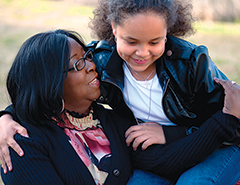When a single mother gets sick, really sick, who takes care of her?
For Anna Rhodes of Georgia, the physical toll of leukemia was only part of her battle. Any hope she had of watching her little girl grow up rested with a marrow transplant. But the financial toll of uninsured transplant expenses triggered many sleepless nights.
Help from Be The Match®
Be The Match stepped in with a small patient assistance grant, but we wished we could have done more. With your support, we can deliver more relief to patients like Anna.
“The burden of being that sick is awful. You can’t work. You can’t get your own groceries. You can’t even empty your own trash,” said Anna. “On top of that, as a single parent, I was very aware that I wasn’t meeting my responsibilities to provide for my daughter. I can’t tell you how that feels.
“The grant helped me buy groceries and pay the electric bill and prescription co-pays. It gave me less to worry about,” said Anna, who received a marrow transplant in 2007 and has been leukemia-free ever since. She finished her nursing degree while undergoing treatment and is now back at work proudly supporting her 11-year-old daughter and enjoying life.
The goal: Helping more transplant patients

Anna and her daughter
Each year 14,000 patients need a marrow transplant from an unrelated donor, but only half receive one. Not having enough financial resources often stands in the way of a patient receiving a potential cure. We rely on your generous contributions to help patients get the transplant they need.
Over the past five years, the number of families who need our help has more than doubled. In 2012, we delivered relief to more than 1,600 patients annually.
The need is growing
Our average total patient assistance recovery grant per family only helps about 10% of those in need. We simply are not keeping pace with the need.
Many patients and their caregivers are away from home for months during transplant and recovery. Some need help with the cost of daily meals. Others need assistance with prescription co-pays (many patients take 20 or more medications per day), transportation to and from the transplant hospital (often in another state), and temporary lodging during recovery. In addition to recovery grants, we also help patients whose insurance does not cover the cost to search for a donor.
Help us do more. We know marrow transplants. We know the barriers to transplant. And we know our patients can’t overcome them without you. Half is not enough. You can change even more lives tomorrow with a financial gift.
